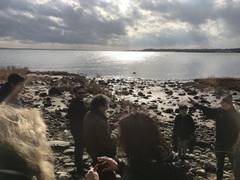Mattot Mas'ei 5778: Triggers
08/07/2018 09:24:55 PM
| Author | |
| Date Added | |
| Automatically create summary | |
| Summary |
Mattot Mas'ei 2018
Like many Jews of my generation, I grew up hearing first-hand testimonies from Holocaust survivors, both in Jewish and secular contexts, like my public school. Often, these testimonies were accompanied by stern reminders that we would be the last generation that would directly encounter survivors. We would be responsible to ensure that their experiences and memory would not be lost.
I recall the following story from one such testimony. Decades after the Holocaust, this survivor saw a dermatologist for an ordinary procedure to remove a mole. The procedure involved burning a small piece of skin. While most of us would find that smell merely unpleasant, the survivor was deeply impacted by the experience. It was a smell she had not experienced since the Holocaust, where it pervaded the death camps. Encountering it again, even in the safety of her doctor's office, even all of those years later, made no difference. Her brain took her right back to the traumatic experiences of her youth during the Final Solution. The memories, images, and emotions all flooded right back. It was as if it were happening right there, all over again.
In recent years, psychologists have identified this phenomenon by the name “triggering.” A trigger is a stimulus, like a smell, sound or sight, that provokes intense reactions related to a past traumatic event. A small thing could set off an overwhelming feeling of sadness, anxiety or panic, as if the traumatic event is happening all over again. The classic example is soldiers returning from war, for whom loud noises or sudden movements can put them mentally back on the battlefield. But anyone who experienced something extraordinarily frightening or dangerous might continue to have triggers from it many years later. One theory suggests that during a fight-or-flight situation, our brains' short-term memory malfunctions, and misfiles the traumatic event as a present occurrence, rather than a past memory.
I mention all of this because in our parasha this week, the combined portion of Mattot-Mas'ei, Moses seems to be triggered by his own past traumatic experiences. The section we read this week begins a new phase in our people's history: the settlement of the land of Israel. The people are encamped on the Western side of the Jordan river, poised to enter the land of Israel. The tribes of Reuven and Gad had large herds of cattle. They noticed that the land on the Western side of the Jordan was good grazing land for cattle, perhaps even better than the mountainous terrain of the land of Israel. They politely ask Moses if they could inherit that land, rather than whatever land they would have been assigned on the Eastern side of the river.
But before they could further detail how exactly this would work, Moses interrupts them and sets off on an angry tirade. In a remarkable 10-verse speech, Moses rebukes those two tribes: “Are your brothers to go to war while you stay here? Why will you turn the minds of the Israelites from crossing into the land that the Lord has given them?” Upon reflection, this is a curious reaction on Moses' part. The tribes said nothing about refusing to go to war. Nor did they try to dissuade the other 10 tribes from entering the land of Israel. Moses might have criticized the tribes, as later commentators did, for putting their own economic interests ahead of the positive value of living in the land of Israel. But that's not what Moses seems to be saying here.
Moses' next words betray what's really on his mind. He launches into a five-verse retelling of the story of the spies. He emphasizes God's anger and how, as a consequence of the people's reluctance to take over the Promised Land, God made them wander for 40 years in the desert. He then accuses these two tribes of acting like those spies. He warns them that if they turn the people against the idea of going in to the land, God will once again wait for another generation to actually bring them in the land.
The comparison between the story of the spies and the story of these two tribes is not obvious. In the story of the spies, 10 prominent leaders of the people explore the land and then explicitly discourage the people, saying they will not be able to overcome its current inhabitants. In our story of the two tribes, the tribes say nothing about the conquest of the land. They give a specific and practical, albeit somewhat selfish, reason to want to remain outside the land. They do not express any explicit doubts about the land itself or the feasibility of conquering it.
Perhaps, as Rashi explains (on 32:7), Moses was worried that the people would think that the tribes' concern about their cattle was just an excuse, and that really they were afraid of the war it would take to conquer the land. Moses was reasonably concerned that this fear, or this perception of fear, would spread like it had 40 years earlier during the episode of the spies. Or, as a midrash has it, the story of the spies shows that the conquest of the land was to be an all-or-nothing matter. If even a small group remained behind or expressed doubt, it could ruin the entire undertaking.
But, perhaps something else entirely is going on here. Perhaps Moses' reaction says more about Moses than it does about the two tribes. The situation with the spies was one of the most traumatic incidents of Moses' eventful life. What was meant to prepare the Israelites to enter the land had the total opposite effect. Mass panic spread among the people. At one point, they stand poised to pelt Moses and Aaron with stones. Were it not for God's intervention, the whole story of Moses' life could have ended right there in terrible failure. Moses barely escapes the mob.
So we should not be surprised, then, that 40 years later Moses reacts so strongly when something vaguely similar happens. Like the Holocaust survivor I mentioned earlier, Moses is triggered by anything that reminds him of the traumatic experience from his past. The emotional residue of the episode of the spies pervades Moses' consciousness. He cannot help but experience the present in terms of that specific, life-altering event in his past. This is why he reacts so strongly, and so negatively, to anything that could be construed as hesitation or doubt about entering the land of Israel.
Psychologists have found similar reactions in traumatized people. Among many possible responses to triggers, they have identified a hyperactive nervous system. This leads to feeling constantly on guard and seeing danger everywhere. The psychologist Seth Gillihan, who was once mugged, recalls “literally jumping at the movement of my own shadow in the streetlights one night, thinking it was someone walking up behind me.[1]” Moses here seem to exhibit something of that same hyper-vigilance. When the two tribes approach him, all he can see is the mob from 40 years earlier about to stone him to death.
Following Moses' triggered reaction, the tribes of Gad and Reuven rush to reassure Moses. For them, this really is about the good grazing lands and not about fear of military battle. To prove it, they promise Moses that they will not only join the other tribes in battle, but serve as the shock-troops, the first wave of attack. Indeed, they will be uniquely able to do so. Unlike the other tribes, they will not have to worry about bringing their families and property into the land (Bekhor Shor on 32:14). Everything works out in the end. Moses' hypervigilance was unwarranted. But we can see how it is rooted in his past experiences.
In recent years, this whole concept of triggering has been the source of controversy, especially in university settings. Some settings have begun adding “trigger warnings” to material that might provoke strong emotional reactions in traumatized people, especially survivors of sexual assault and similar violations. Proponents of such warnings argue that they allow students with post-traumatic stress to feel safe in class and to avoid being surprised by especially upsetting material. When done sensitively and well, these warnings should facilitate engagement with difficult material, not shut it down. These warnings are similar to the “view discretion advised” warnings that have long accompanied violent movies and television. Emotional safety, in this view, is a necessary prerequisite to intellectual engagement.
Opponents raise concerns about censorship, academic freedom, and under-estimating students' capacity for resilience. It is impossible to go through life avoiding anything that might seriously upset you. And even if you could, it might come at the cost of never developing the healthy coping mechanisms that relieve post-traumatic symptoms. These are serious concerns. It does appear that this concept has, at times, crept beyond initial concerns about traumatized students into a tool for shutting down the healthy debate that is at the core of liberal arts education.
I don't have an easy answer to this debate. I imagine this will continue to be worked out on campuses as new norms emerge. But we can see in this Torah portion how the lingering effects of traumatic experiences can stay with us many years later. If it happened to Moses, it could happen to anyone.
Throughout our lives, we might encounter someone reacting in a strange way to something we consider fairly innocuous. For example, I often am visibly startled by loud, sudden noises like a siren or a barking dog. Evidently this is somewhat common for people who were born prematurely, as I was. When we encounter such things in others that we find peculiar or inexplicable, our spiritual task is to react with compassion and curiosity, rather than judgement. As the adage attributed to the Scottish theologian John Watson goes, “Always be kind, for everyone you meet is fighting a hard battle you know nothing about.[2]” May God grant us the empathy to do so. Shabbat Shalom.
Sat, November 1 2025
10 Cheshvan 5786
Photo Gallery
Photo Albums
Upcoming Events
-
Saturday ,
NovNovember 1 , 2025Dror Israel Shabbat
Shabbat, Nov 1st 11:30a
Dror Israel Shabbat Dror Israel’s Mirit Sulema, along with two leaders of the Arab Youth Movement NOAL, Tal Tunik and Shadi Habiballa, will speak during a Kiddush lunch about their important work with Arab Israeli youth and bringing Jewish, Arab, and Druze youth together. Saturday, November 1st, approx. 11:30am KTI Social Hall "We eat together, laugh together. We talk about what we think of each other, and what will help bring peace.” RSVP Appreciated -
Saturday ,
NovNovember 1 , 2025KTI Gala - A November to Remember Digital Journal
Motzei Shabbat, Nov 1st 7:00p to 10:00p
-
Saturday ,
NovNovember 1 , 2025KTI Gala - A November to Remember
Motzei Shabbat, Nov 1st 7:00p to 10:00p
Saturday, November 1, 2025, 7:00 PM - 10:00 PM Harrison Meadows -
Wednesday ,
NovNovember 5 , 2025Rabbi, May I? Modern Responsa
Wednesday, Nov 5th 10:00a to 11:30a
Wednesdays, 10 - 11:30 AM, KTI Library Ever since Abraham’s famous argument with God, Judaism has been full of debate. Moses and Korah, David and Nathan, Hillel and Shammai, the Vilna Gaon and the Ba’al Shem Tov, Spinoza and the Amsterdam Rabbis . . . the list goes on. No wonder that Judaism cherishes the expression machloket l’shem shamayim, “an argument for the sake of heaven.” Beyond their historical importance, what makes these disputations so compelling is that nearly all of them, regardless of their epochs, are still being argued. The parade of characters spanning three millennia of biblical, rabbinic, and modern disputation reflects the panorama of Jewish history with its monumental political, ethical, and spiritual challenges. This series will examine Jewish responses to exile from the biblical period to our modern day. Considering texts from all genres of Jewish literary creativity, we will explore how the realities and iterpretaions Join as we re-open these timeless debates that lead us to the core of 3,000 years of Jewish conversation. • Justice: Abraham vs. God (October 19) • Holiness and Authority: Moses vs. Korah (November 9) • Inclusion: The Five Daughters vs. the Twelve Tribes (November 30) • Accountability and Morality: David vs. Nathan (December 21) • Resistance: Ben Zakkai vs. the Zealots (January 18) • Law: Hillel vs. Shammai (February 15) • Spirituality: The Vilna Gaon vs. the Baal Shem Tov (March 15) • Boundaries: Spinoza vs. the Amsterdam Rabbis (April 19) • Religious Evolution: Geiger vs. Hirsch vs. Frankel (May 10) • Zionism: Herzl vs. Wise (May 31) -
Thursday ,
NovNovember 6 , 2025Coffee with the Rabbi
Thursday, Nov 6th 8:00a to 9:00a
Start your morning with some caffeine and casual or meaningful conversation! Join Rabbi Goldberg for a Coffee Chat! Stop by Rye Ridge Starbucks any of the following Thursdays, between 8-9am: June 12 and 26 July 10 and 24 August 7 and 21 September 4 and 18 October 16 and 30 November 6 and 20 December 4 and 18
Privacy Settings | Privacy Policy | Member Terms
©2025 All rights reserved. Find out more about ShulCloud






